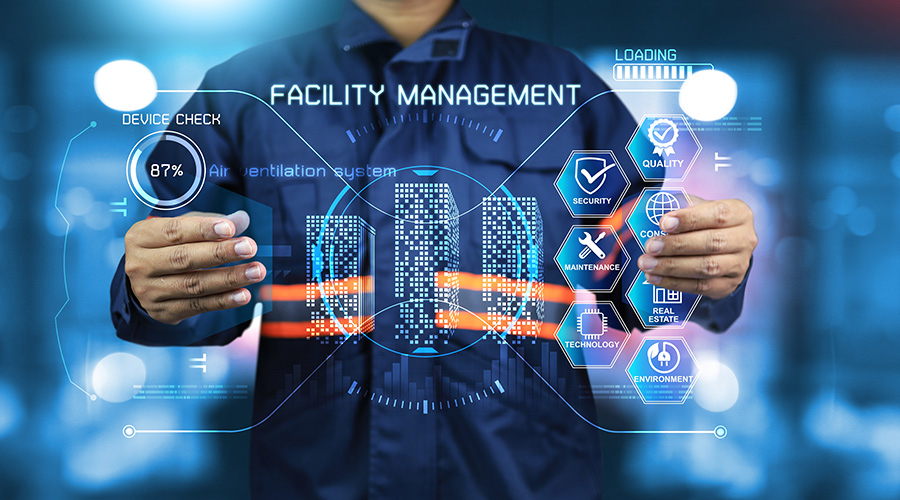Facility Management for Commercial Structures-- A Total Review
Facility Management for Commercial Structures-- A Total Review
Blog Article
Key Fads Forming the Future of Facility Administration in 2024
As we expect 2024, the landscape of facility monitoring is poised for substantial improvement, driven by a number of essential fads. The integration of wise building modern technologies and a shift towards data-driven decision-making promise to boost operational effectiveness while focusing on sustainability in method. The introduction of crossbreed work versions is improving office environments, requiring innovative design solutions that cater to evolving worker requirements. In the middle of these modifications, the focus on occupant wellness remains to obtain traction, underscoring the importance of a healthy workplace. Exactly how these patterns will show up in practice continues to be a crucial question for industry experts.
Smart Building Technologies

Smart structure modern technologies encompass a broad selection of systems, including intelligent lighting, cooling and heating controls, and security systems. By integrating these systems, center managers can keep track of and change specifications in real-time, causing considerable reductions in power waste and functional prices. For example, smart sensors can detect tenancy levels and change lights and temperature appropriately, ensuring that energy is just made use of when essential.
In addition, these modern technologies facilitate enhanced data collection, permitting organizations to track usage patterns and identify opportunities for additional renovations. The application of smart building modern technologies not only adds to sustainability goals however also develops much healthier work environments that can improve employee efficiency and contentment.
As we move into 2024, the fostering of smart structure technologies will likely accelerate, reflecting a wider change towards more intelligent, responsive, and sustainable facility administration techniques.
Data-Driven Decision Making
Significantly, companies are leveraging data-driven decision making to improve facility management practices. By using information analytics, facility managers can derive actionable insights that substantially enhance operational performance and resource allowance. The integration of innovative innovations, such as IoT sensors and real-time tracking systems, makes it possible for the collection of vast quantities of information on building efficiency, occupancy rates, and energy consumption.
This wealth of details enables facility managers to identify patterns, predict upkeep demands, and proactively address issues prior to they rise. For example, anticipating analytics can anticipate devices failures, decreasing downtime and fixing expenses. Furthermore, information visualization devices promote far better interaction among stakeholders, making certain that educated choices are made collaboratively.
Additionally, data-driven techniques boost calculated planning by allowing center managers to examine the effectiveness of existing techniques and make educated options pertaining to financial investments in innovation or framework. As companies significantly focus on operational excellence, data-driven choice production is positioned to end up being a cornerstone of effective center management techniques in 2024 and beyond. Eventually, the capability to utilize information efficiently will encourage companies to produce a lot more effective, efficient, and resilient facilities.
Sustainability and Environment-friendly Practices
The emphasis on data-driven decision making naturally aligns with the growing concentrate on sustainability and environment-friendly practices within center management. As companies significantly prioritize ecological responsibility, facility supervisors are leveraging analytics to enhance source use, reduce waste, and minimize carbon impacts. This calculated strategy allows the combination of energy-efficient systems, such as LED lights, clever a/c controls, and renewable power sources into center operations.
Furthermore, the application of lasting practices extends beyond energy intake. Center managers are advertising and adopting eco-friendly materials recycling efforts to create a round economy within their facilities. This not only improves the environmental profile of the organization however also fosters a culture of sustainability amongst staff members.
Conformity with environmental guidelines is another important element driving the fostering of environment-friendly practices. By making use of information analytics, facility managers can monitor conformity metrics and identify areas for enhancement, making sure adherence to neighborhood and international sustainability standards.
Crossbreed Work Versions
A substantial shift towards crossbreed work versions is reshaping the landscape of center management in 2024. This standard incorporates remote and in-office job, requiring a reevaluation of space utilization, resource allotment, and employee involvement strategies. Organizations are significantly recognizing the importance of versatile work spaces that cater to diverse demands and choices.
Center managers should adjust by applying versatile workplace layouts that support joint initiatives while supplying areas for concentrated job. This consists of the integration of innovation to promote seamless interaction and collaboration among in-office and remote workers. Smart building remedies, outfitted with analytics and sensors, enable real-time tracking of area usage, allowing companies to enhance their atmospheres efficiently.
Moreover, hybrid job designs stress the requirement for reliable facility monitoring that prioritizes employee experience. In significance, the hybrid job model is transforming center administration, urging an aggressive technique to meet the click here for info developing needs of the labor force.
Improved Resident Wellness
As companies welcome hybrid work models, an increased concentrate on occupant wellness is ending up being essential to facility monitoring methods. Facility Management. This change identifies that a healthy and balanced and completely satisfied workforce straight impacts efficiency and retention rates. Center managers are currently focusing on environments that promote physical and psychological well-being, integrating elements such as natural lights, biophilic design, and available wellness sources

Modern technology plays a crucial duty in i was reading this this development. Smart building systems can keep track of ecological aspects and adjust settings in real-time, guaranteeing ideal convenience degrees - Facility Management. Additionally, feedback devices, such as tenancy sensors and employee studies, permit facility supervisors to continuously improve wellness efforts based on occupant requirements.

Final Thought
In 2024, the future of facility management will certainly be significantly influenced by the integration of smart structure modern technologies and data-driven decision-making, fostering boosted functional effectiveness. These trends collectively emphasize the progressing landscape of facility monitoring in reaction to contemporary difficulties and chances.
Facility managers are embracing eco-friendly products and promoting reusing campaigns to produce a round economy within their facilities.A considerable shift towards hybrid work versions is reshaping the landscape of center monitoring in 2024.Additionally, crossbreed work designs emphasize the requirement for efficient center administration that focuses on employee experience.As organizations accept hybrid job models, an enhanced focus on resident health is why not find out more ending up being indispensable to center administration approaches.In 2024, the future of facility management will be considerably influenced by the integration of clever building innovations and data-driven decision-making, promoting enhanced functional performance.
Report this page